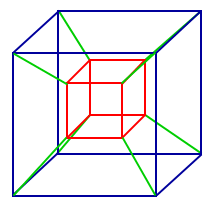Consider the real number that is represented by a zero and a decimal point, followed by a never-ending string of nines:
0.99999…
It may come as a surprise when you first learn the fact that this real number is actually EQUAL to the integer 1. A common argument that is often given to show this is as follows. If S = 0.999…, then 10*S = 9.999… so by subtracting the first equation from the second, we get
9*S = 9.000…
and therefore S=1. Here’s another argument. The number 0.1111… = 1/9, so if we multiply both sides by 9, we obtain 0.9999…=1.
Presentation Suggestions:
You might also mention that by similar arguments, every rational number with a terminating decimal expansion has another expansion that ends in a never-ending string of 9’s. So, for instance, the rational 7/20 can be represented as 0.35 (the same as 0.35000…) or 0.34999…
The Math Behind the Fact:
When seeing these arguments, many people feel that there is something shady going on here. Since they do not have a clear idea what a decimal expansion represents, they cannot believe that a number can have two different representations.
We can try to clear that up by explaining what a decimal representation means. Recall that the digit in each place of a decimal expansion is associated with a (positive or negative) power of 10. The k-th place to the left of the decimal corresponds to the power 10^k. The k-th place to the right of the decimal corresponds to the power 10^(-k) or 1/10^k.
If the digits in each place are multiplied by their corresponding power of 10 and then added together, one obtains the real number that is represented by this decimal expansion.
So the decimal expansion 0.9999… actually represents the infinite sum9/10 + 9/100 + 9/1000 + 9/10000 + …
which can be summed as a geometric series to get 1. Note that 1 has decimal representation 1.000… which is just 1 + 0/10 + 0/100 + 0/1000 + … so if one realizes that decimal expansions are just a code for an infinite sum, it may be less surprising that two infinite sums can have the same sum.
Hence 0.999… equals 1.
How to Cite this Page:
Su, Francis E., et al. “Why Does 0.999… = 1?.” Math Fun Facts. <http://www.math.hmc.edu/funfacts>.
Fun Fact suggested by:
Francis Su

